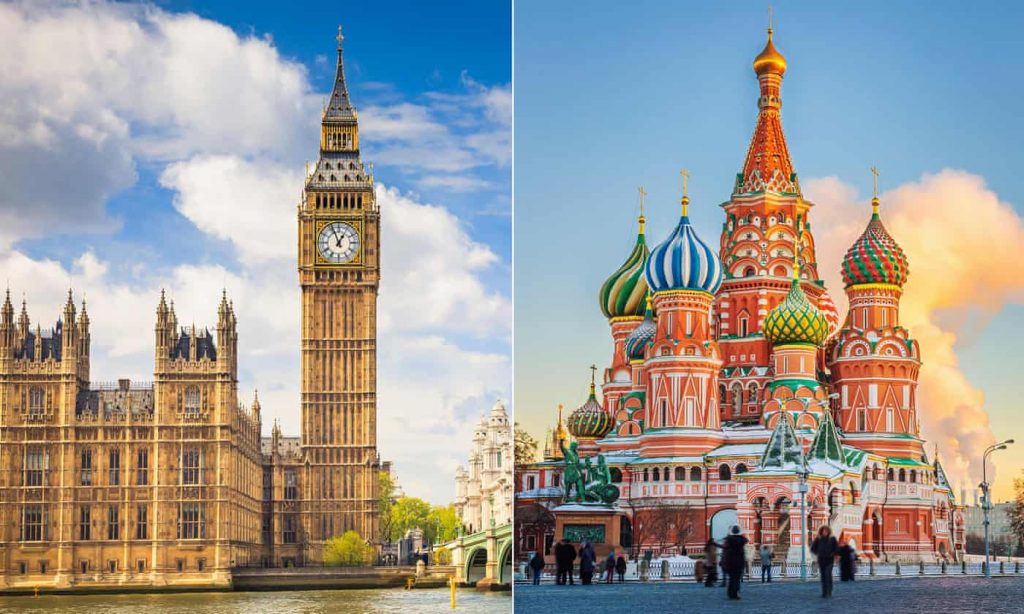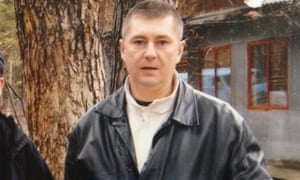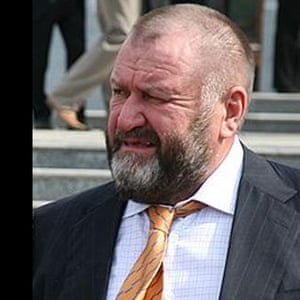

On 21 December 2016 Evgeny Lazarevich, a 55-year-old father to four daughters, disappeared in the Kemerovo region of Siberia. A week later his Ford Explorer was found in the city of Novokuznetsk, 30 miles from the coalmine where he worked as its administrator, overseeing its liquidation. According to his sister, Anna, the car’s number plate had been removed and its inside sprayed with pepper “so police dogs would not take the trail”.
Now, desperate for answers, his family have escalated their efforts to find him. Curiously, though, their efforts have been focused not on Siberia, nor even Russia, but on London where a small army of PR agents, private investigators and lawyers have been working behind the scenes to push the story of Lazarevich’s disappearance to politicians and journalists.
That so many people are engaged in establishing the truth of what happened to one man appears laudable. But the truth is more complicated.
For Lazarevich’s disappearance is just one plotline in a larger story about feuding oligarchs who view the UK’s media, parliament and courts as pawns on a giant chessboard. It is a story that offers a rare insight into how, in their unyielding battle for supremacy, truths and untruths collide so frequently that it is impossible to discern where fact ends and fiction begins. Add in death threats, organised crime, tax havens and well-connected Kremlin supporters, and the comparison with the BBC’s McMafia television drama becomes all but inevitable.
But back to Lazarevich.

Like many other Siberian mine administrators, he was subject to intimidation from organised criminal gangs who wanted to acquire coal illegally. On one occasion he was kidnapped by a gang who wanted him to sign documents handing over his mine. On another he was arrested on what his family say were trumped-up charges.
In 2016, Lazarevich’s family say he decided to testify against a powerful mining magnate, Alexander Shchukin. A former mining engineer with an uncompromising persona, Shchukin amassed a fortune in the wild west Russia of the 90s, when as part of a consortium of businessmen he acquired mines and other industrial interests in Siberia. At one stage Forbes suggested his wealth totalled more than $1.8bn(£1.4bn).
But his influence had begun to wane and in November 2016, a month before Lazarevich disappeared, Shchukin was charged with extorting the shares in a coalmine, a charge he denies.
There are no documents to corroborate Anna Lazarevich’s claim about her brother’s willingness to testify against the magnate, who is currently under house arrest, only letters she wrote to the authorities alleging this was the case. “My brother wanted justice,” she told the Observer. “He was a decent person and a man of principle. He was ready to testify against Shchukin and his gang.”
She made similar claims when she appeared earlier this year at a specially organised dinner in Westminster in which an extraordinary 31-page document, titled Blood Coal Money – which made a series of uncorroborated allegations against the magnate – was shared with a network of influential people including an MP, a peer, eminent lawyers and at least one former spy.

In a statement, Shchukin’s representatives said: “Mr Shchukin is neither accused nor a suspect in respect of this disappearance, which took place after Mr Shchukin was already under arrest. He’s never had business dealings or relations with Mr Lazarevich or the mine in which Mr Lazarevich acted as a bankruptcy trustee.”
Why Anna Lazarevich believed that British parliamentarians would be interested in the disappearance of a Siberian coalmine administrator is, at first glance, unclear. “I have neither financial nor political interests,” she told the Observer. “I am interested in the fate of my brother and the opportunity to at least find his body. I have exhausted the resources to make the investigation work.”
But Blood, Coal, Money provides an explanation. In addition to the lurid allegations it makes against Shchukin, the document tracks the flow of money to London from the Shchukin family’s chief asset, the Polosukhinskaya mine in Siberia, which produces high-grade coking coal for use in power stations, and is held in a trust in Cyprus. The chief beneficiaries of this trust are Shchukin’s daughter, Elena Shchukina, and her husband, Ildar Uzbekov, who live in a £15m mansion in Highgate, north London.

The document makes much of the juxtaposition between the harsh conditions of workers in Siberia and the gilded lifestyle enjoyed by Shchukina, who runs an art gallery in Mayfair. “We toil for black bread in Siberia,” it states above a photograph of weary-looking miners. “Meanwhile in Mayfair, the daughter of [Shchukin] is feasting,” it adds, explaining that a single glass of wine at Shchukina’s favourite restaurant can apparently cost £850 – “nearly FIVE times the miner’s monthly pension”.
Shchukina and her husband are no strangers to such attacks. Earlier this year they found themselves the subject of an extraordinary film, produced to accompany Blood, Coal Money, which made outlandish claims about the relationship between the secret intelligence service, MI6, and Uzbekov. The London premiere – promoted on a London bus – was cancelled when Uzbekov brought libel proceedings, one of many he has pursued in recent years as he engages in what oligarchs call “lawfare” – legal action against assorted enemies in multiple jurisdictions. In a strange twist of life mirroring art, the putative guest list for the film’s premiere, seen by the Observer, indicates that the film’s makers had intended to invite the McMafia actor, James Norton, and the journalist on whose book the series was based, Misha Glenny.
At one stage this newspaper was promised an interview, though the offer was later withdrawn, with Stanislav Antipin, the first secretary at the Russian embassy in London.
Antipin was not the only Kremlin advocate raising concerns about Lazarevich’s disappearance. Alexander Korobko, a Russian journalist who wrote a favourable biography of President Putin and directed a documentary-style film exonerating Andrei Lugovoi, chief suspect in the poisoning of Alexander Litvinenko, was also on the Lazarevich campaign.
So too was Dr Andrei Liakhov, a well-connected former Russian military officer who was injured in a chemical-weapons attack in Afghanistan, and who, during an interview with the Observer, held up his mobile phone to reveal that it apparently contained a number for President Putin. “You only ring this number when you have something to say,” Liakhov explained.
Liakhov told the Observer he had become involved in the campaign because he believed in getting justice for Lazarevich, not because he was being paid. Korobko, too, claims to have been paid only a nominal fee. The son of a miner, he apparently wanted to help the Lazarevich family.
Anna’s story about her brother’s disappearance was crucial in winning the politicians’ support. “I came out of the meeting with Anna Lazarevich very impressed and just wanted to see justice done,” Bellingham said. He urged the UK to “use the National Crime Agency to track or chase any illicit funds attached to this criminal case”. Razzall also wanted the NCA involved.
But by June things were starting to unravel. A treasure trove of purportedly hacked emails, leaked to journalists, raised troubling questions about the true intentions of those behind the campaign which, it emerged, had a codename – “Project Pike” – shchuka meaning pike in Russian.
One email exchange revealed that those pushing the campaign insisted on paying Sans Frontières only if the PR firm succeeded in getting stories into the media to promote the anti-Shchukin documentary.
Sans Frontières says that it refused the demands. But emails show the firm did draw up an indicative price list, charging £40,000 for a “story placement in a Tier 1 or national news publication in the UK” and £50,000 for any video featured in “a Tier 1 broadcaster”. Clips uploaded to YouTube were priced at £5,000. The firm insists no payment was ever received and the project to promote the documentary never got off the ground.
Then a murky story that had mutated from a quest for justice to one about black propaganda became murkier still. It transpired that some of the hacked emails were fake. Others contained false information.
One such email purportedly showed an aide to Chris Bryant, the Labour MP who formerly chaired the all-party parliamentary group on Russia, organising an event to discuss what action the UK could take against Shchukin and Uzbekov. But no email was written. Scotland Yard is now investigating.
Another email, purportedly sent by Liakhov, suggested that he, Bellingham and Ben Wallace, the then security minister, had participated in an “hour-long teleconference” after which the cabinet had come to view the campaign against Uzbekov and his wife as “a pilot project for using Unexplained Wealth Orders to cleanse the United Kingdom of unwanted residents”. But no such teleconference took place. And there was no cabinet backing for the plan.
“While the motivation behind making these false claims is unclear, we are alive to the potential for disinformation to be used by powerful individuals, some countries and other sources to undermine confidence in the UK government and its policies,” a Home Office spokeswoman said as the contents of the leaked emails found their way into newspapers, triggering fears that British parliamentarians were being targeted by Russians with close links to the Kremlin.

When the Observer met Uzbekov in the exclusive Mayfair club Annabel’s, his favoured London haunt where a wagu beef cheeseburger (without chips) costs £28, he seemed sanguine about the campaign being conducted against him and his father-in-law. Uzbekov suggested it was being waged by an oligarch close to Putin and several other powerful Russian businessmen, including a former senior KGB officer. “Hit me with an Unexplained Wealth Order,” Uzbekov shrugged. “It will be the shortest investigation in history.”
The true aim of the black propaganda campaign against him, his wife and his father-in-law, he suggested, was to wrest control of their family trust in Cyprus and its ownership of the Polosukhinskaya coalmine, a cash cow that produces earnings of $100m a year, paying tens of millions of dollars in taxes to the Russian authorities; all, he insisted, meticulously documented.
The trust’s creation was an insurance policy, codenamed French Fish, a play on Project Pike, said Uzbekov who travels around London in a bulletproof Range Rover and has filed complaints to the police in Cyprus, Monaco and London about attempts made on his life. “It was designed for two eventualities – Shchukin being arrested and Shchukin being killed,” he said. “There are no shareholders in the trust. So who are you going to put in prison? Who are you going to shoot? You can hold a gun to my head, I can’t do anything.” This, he suggested, had compelled Shchukin’s enemies to find alternative means of acquiring the trust’s assets: the story of Lazarevich’s disappearance was merely the opening of another front in the campaign, the movement of another piece across the chessboard.

“Shchukin was questioned,” Uzbekov said. “There are no facts or proof of any involvement of his. Detectives consider Lazarevich’s stance against [illegal] black mining [perpetrated by criminal gangs] as the key element of the investigation.”
Cryptically, he added: “The police know who did it. They have the suspect under 24-hour surveillance. The reason I am aware of that is because at one stage it was considered by the local police that my murder was being discussed by the very same people.”
He spoke as if such matters were normal before acknowledging he could see no end to the propaganda war being waged for control of the coalmine. “Of course this will escalate,” he added. “We will escalate this. Because everywhere you look you find dirt.”
Through the window behind him Berkeley Square was alive in the lunchtime sun. The exclusive restaurants, estate agents and car dealerships – all beneficiaries of the huge amounts of Russian wealth that have flowed into the capital since the 90s – seemed to be doing brisk trade.
Meanwhile, 3,500 miles away in Siberia, a mining magnate remains under arrest for extortion, the case against him advancing at a glacial pace, while four daughters are minus a father. Whatever Project Pike had hoped to achieve, it’s hit stalemate.
